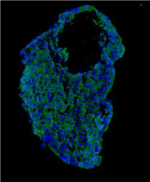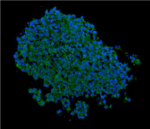Leclerc Project


Leader: Estelle Leclerc
Project Title: Development of Monoclonal Antibodies to Inhibit RAGE Activation in Pancreatic tumors.
In photos to the right spheroids of BxPC-3 and PANC-1 stained with anti-RAGE polyclonal antibodies (green). The nuclei were stained with DAPI (blue). |
Recent evidence suggests that the Receptor for Advanced Glycation End products (RAGE) contributes significantly to the progression of PC, as well as to the formation of desmoplasia. RAGE is a cell-surface receptor that is activated by extracellular ligands.
The group has identified anti-RAGE antibodies that significantly reduce the in vitro proliferation of PC cells. The goal of the research is to undertake detailed mechanistic studies to demonstrate the roles of anti-RAGE antibodies in reducing the tumor growth and desmoplasia in PC cells. The researchers will measure the in vitro binding affinities of anti-RAGE antibodies for RAGE by ELISA and surface plasmon resonance. The epitopes of the antibodies will be determined by using peptide arrays of RAGE.
The group will ascertain whether the anti-RAGE antibodies inhibit the proliferation, migration, or invasion of PC cells, which will lead to delineation of the molecular mechanisms of RAGE inhibition by anti-RAGE antibodies. The latter will involve identification of key signaling molecules that are activated in PC tumors via Western blot analysis of cell hydrolysates prior to and subsequent treatment with the antibodies. This will follow the determination of changes in the levels of extracellular matrix proteins and chemokines secreted by antibodies treated 3D spheroid culture of fibroblasts. The efficacies of selected antibodies in tumor growth will be investigated in the KPC mouse model of PC.


